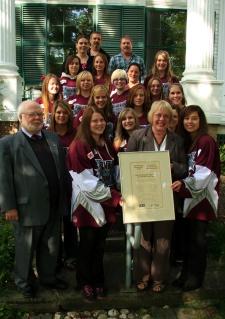In early 2009, the Woodstock High School Lady Thunder hockey team was undefeated on the ice, but after word got around that two of its players were gay, taunts and harassment toward the team flooded the rink and the internet.
Right-winger and assistant captain Sierra Paul, 16, and centre Alyssa McLean, 17, told their teammates about their sexual orientation and received nothing but support. Another team in the league, however, posted anti-gay messages on Facebook and refused to shake hands after games.
“They said, ‘You’re a disgrace to society and the world would be a better place if you were dead,'” Paul says, adding the whole team was taunted with homophobic slurs.
“They get in your head,” says McLean, “You get discouraged.”
The Lady Thunder girls didn’t hurl insults back or complain to administrators. Instead they approached the school’s gay-straight alliance (GSA) and all 18 team members wore rainbow-striped pins, with the words “No Homophobia,” to their games.
Not only was the move a show of solidarity, it opened up a dialogue with other teams in the province. They even shared the pins with a team from northern New Brunswick.
Word of the girls’ efforts eventually got back to Gordon Porter, chair of the New Brunswick Human Rights Commission and, on Sep 16, he presented the WHS Lady Thunder with the provincial human rights award.
Name-calling is common in sport, Porter says, but the girls’ reaction to it was something special and well worthy of recognition.
“We live in a different society then when I was your age,” he told the team and their classmates during a ceremony in the school’s auditorium, “Our society wasn’t as tolerant. It wasn’t as progressive as you take for granted.”
It’s no surprise, he says, WHS students stood up for gay rights. The school has a long history of promoting diversity in its hallways. There has been an active GSA at the school since 2003 and Richard Blaquiere, who started the group, won the same award in 1993, for his work in human rights education.
The NB Human Rights Commission at Wednesday’s ceremony also acknowledged Rev Dr Brent Hawkes with the Pioneer of Human Rights Award, the fifth such recognition the HRC has given in its history.
Hawkes hails from Bath, NB, about 49 km from Woodstock, and is the senior pastor of the Metropolitan Community Church in Toronto. An openly gay minister, Hawkes is a leader in the Canadian gay rights movement.
He left the area after coming out to his family in the 1970s because he “didn’t feel safe.” It was a pleasure, he says, to come back in recognition of the province’s support of lesbian, gay, bisexual and transgendered rights.
“I’ve done too many funerals to stay quiet,” he says of his unrelenting work. “I’ve seen too many families abandon their son or daughter … I’ve seen too many friends not speak up to stay quiet.”
In 2001, he performed one of the world’s first legal gay marriages. He pointed out that he fought the Canadian government and was subsequently awarded one of its highest honours, membership in the Order of Canada.
Throughout his career, he’s been the target of threats and assaults. He told onlookers stories of wearing bullet-proof vests and travelling under guard.
“I wish I had the hockey team protecting me, I might have been safer,” he jokingly told the Lady Thunder girls, sitting clad in their maroon and grey jerseys in the front row. He applauded the team and Woodstock High for supporting gay students.

 Why you can trust Xtra
Why you can trust Xtra


